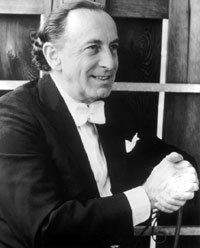

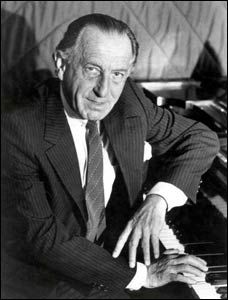 BD: When you come to a new piano which is a good piano, how
much do you make that piano sound like you and how much do you adapt yourself
to the sound coming out of the instrument?
BD: When you come to a new piano which is a good piano, how
much do you make that piano sound like you and how much do you adapt yourself
to the sound coming out of the instrument?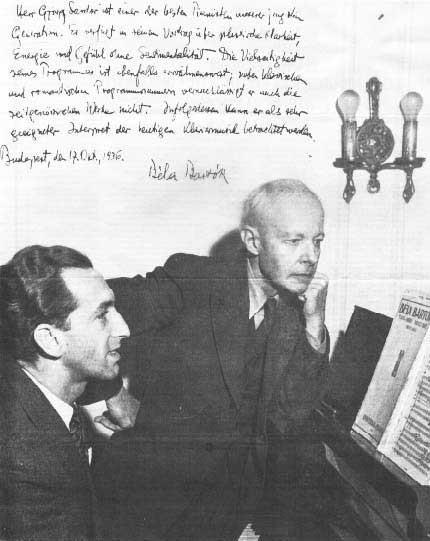 GS: I would say we have to examine this question from different
aspects. Time helps a great deal because more and more people play it,
and more and more people know it. Therefore it penetrates more and
more in the musical world. We talked about "durability," and good music
will become popular if it lasts. This kind of music does last.
However, like with every composer there is a certain stamp that people put
on their compositional style. For instance, Rachmaninoff is supposed
to be romantic and sentimental, and Bartók is supposed to be barbaric
and hard. This, unfortunately, puts a stamp on the interpretation of
the music. Today when you hear Rachmaninoff, it's not romantic, it's
sentimentalized, it's dripping. And this is very interesting because
we have the Rachmaninoff recordings where you can hear approximately what
Rachmaninoff wanted to do! Nevertheless there are people who play
the Third Concerto fifteen minutes
longer than he did. Every note is sentimentalized. It's squeezed
out; it hasn't got that drive, that demonic or inspired quality that he had.
GS: I would say we have to examine this question from different
aspects. Time helps a great deal because more and more people play it,
and more and more people know it. Therefore it penetrates more and
more in the musical world. We talked about "durability," and good music
will become popular if it lasts. This kind of music does last.
However, like with every composer there is a certain stamp that people put
on their compositional style. For instance, Rachmaninoff is supposed
to be romantic and sentimental, and Bartók is supposed to be barbaric
and hard. This, unfortunately, puts a stamp on the interpretation of
the music. Today when you hear Rachmaninoff, it's not romantic, it's
sentimentalized, it's dripping. And this is very interesting because
we have the Rachmaninoff recordings where you can hear approximately what
Rachmaninoff wanted to do! Nevertheless there are people who play
the Third Concerto fifteen minutes
longer than he did. Every note is sentimentalized. It's squeezed
out; it hasn't got that drive, that demonic or inspired quality that he had.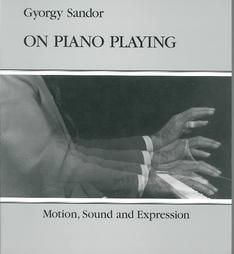 GS: If you have a very good typewriter and you know how to
spell in English, that doesn't make you a writer. But you have the
tools! Now if you happen to be a good writer and don't have a typewriter
and don't know spelling, then you are in trouble. But if you have the
tools, then you can express your thoughts. Now when you play Beethoven,
if you are a very good pianist you play in a rather natural way. You
don't force the piano — unless the music calls for
forcing. If you are able to express basic human emotions, such as directness
and colorfulness convincingly, then you apply that! If you take the
Moonlight Sonata, you certainly
won't play the first movement gritting your teeth, sitting there holding
your muscles tight and playing pianissimo. The mood is totally off!
GS: If you have a very good typewriter and you know how to
spell in English, that doesn't make you a writer. But you have the
tools! Now if you happen to be a good writer and don't have a typewriter
and don't know spelling, then you are in trouble. But if you have the
tools, then you can express your thoughts. Now when you play Beethoven,
if you are a very good pianist you play in a rather natural way. You
don't force the piano — unless the music calls for
forcing. If you are able to express basic human emotions, such as directness
and colorfulness convincingly, then you apply that! If you take the
Moonlight Sonata, you certainly
won't play the first movement gritting your teeth, sitting there holding
your muscles tight and playing pianissimo. The mood is totally off!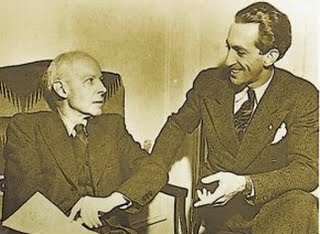 GS: There is a chapter where I draw a parallel between live
performances and canned performances, or competitions, which are very similar.
In live performances, what is the most important thing when you go to a recital?
You want to hear a piece of music in a very unique, very artistic, very
beautiful way, possibly with individuality, maybe with little excesses here
and there, but something very personal and very different from the cliché.
When you go to a live concert hall, you expect the pianist to play from pianississimo
to fortissimo — the whole range from the lowest, most
hardly audible sound, to the loudest one. You expect a lot of coloring.
GS: There is a chapter where I draw a parallel between live
performances and canned performances, or competitions, which are very similar.
In live performances, what is the most important thing when you go to a recital?
You want to hear a piece of music in a very unique, very artistic, very
beautiful way, possibly with individuality, maybe with little excesses here
and there, but something very personal and very different from the cliché.
When you go to a live concert hall, you expect the pianist to play from pianississimo
to fortissimo — the whole range from the lowest, most
hardly audible sound, to the loudest one. You expect a lot of coloring.
Gyorgy SandorKeyboard tiger who
championed Bartok's piano works by Leo Black; published
in The Guardian, Thursday, 26 January
2006 The Hungarian-American pianist Gyorgy Sandor, who has died aged 94, studied the piano with Bela Bartok and composition with Zoltan Kodaly - two men calculated to set the severest standards for the rest of a musician's life - at the Liszt Royal Conservatory in his native Budapest. His decision to settle in the United States in his late 20s reflected his liking for the way of life there and was, he said, not political. He had played throughout the world by the time of his 1939 Carnegie Hall debut, in a programme of works by Bach, Schumann and Brahms, but his greatest fame came from his performances of Bartok. Along with his compatriot Andor Foldes, a year younger, Sandor brought Bartok into normal concert life at a time when he was regarded as almost unplayable, and certainly unenjoyable. Sandor gave the posthumous premiere of Bartok's Third Piano Concerto with the Philadelphia Orchestra under Eugene Ormandy in 1946, and four decades later was the first public performer of the composer's long-lost transcription of his Concerto for Orchestra. He continued to appear in public into his 90s, and press notices stressed that the poetry and sensitivity of his playing only increased as age took its toll of his extraordinary keyboard facility. His final concert was given in Turkey last April, after he had had a heart attack. Producing BBC radio recordings during the 1960s, I immediately responded to Sandor's playing - above all, its vital, springy rhythm. He was the complete pianist, one of the last old-style keyboard tigers, but free of the exaggerated "personal interpretations" with which many charismatic figures from the past raise one's eyebrows. Along with everything else, he even had taste. He did missionary work not only for Bartok, but also on behalf of Prokofiev's piano music. Around the time when Sandor recorded it all commercially, a colleague of mine obtained clearance to have him do the same in the BBC studios, only to go on leave as it was about to happen. Invited to bail my colleague out, I knew this would be a make-or-break weekend and leave me either vowing never to hear another note of Prokofiev or - and that was how it turned out - totally converted. The most impressive thing, however, was the first I ever heard Sandor play, not by one of his modern masters, but by Bach. Bartok's transcription of an organ trio-sonata was in rapidly moving octaves for the whole of its two outer movements, and, of course, in three parts - the effect was of a very good, stupendously rhythmical two-piano team. Sandor's magnetism was summed up by a pianist friend who accompanied me to London's South Bank to hear him: "I love these old-style virtuosos where in the quick passages the hands become a blur." He was the most purely exciting pianist with whom I had the privilege of working. Sandor's 1981 book On Piano Playing: Motion, Sound, Expression encapsulates the keen analytical intellect behind the charisma, laying stress on correct use of the body, with dicta like "technique precedes art", "we must try to avoid any excesses and exaggerations throughout our pianistic activities", or, summing up a lifetime's experience, "Today more than ever, audiences mistake the excessively tense muscular activities of the performer for an intense musical experience, and all too often we see the public impressed and awed by convulsive distortions and spastic gyrations." He even devoted his final chapter to Mannerisms and Excess Energy. Here was an old-world figure but forward-looking thinker; musical performance desperately needs the sense of rightness, completeness and economy that pervaded his playing and thinking. Sandor applied his insight as teacher at the Southern Methodist University in Dallas (1956-61), at the University of Michigan, Ann Arbor, for two decades, and from 1981 at the Juilliard School, New York, where his pupils included Hélène Grimaud, and, interestingly, the outstanding fortepianist Malcolm Bilson. A book on Bartok and his music was complete by the time Sandor died. Marriage to a member of the Habsburg dynasty ended in divorce; he is survived by a son and two stepdaughters. · Gyorgy Sandor, pianist, born September 21, 1911; died December 9, 2005 |
This interview was recorded in Chicago in February, 1990. Portions
(along with recordings) were used on WNIB in 1992 and 1997. This transcription
was made and posted on this website in 2010.
To see a full list (with links) of interviews which have been transcribed and posted on this website, click here.
Award - winning broadcaster Bruce Duffie was with WNIB, Classical 97 in Chicago from 1975 until its final moment as a classical station in February of 2001. His interviews have also appeared in various magazines and journals since 1980, and he now continues his broadcast series on WNUR-FM, as well as on Contemporary Classical Internet Radio.
You are invited to visit his website for more information about his work, including selected transcripts of other interviews, plus a full list of his guests. He would also like to call your attention to the photos and information about his grandfather, who was a pioneer in the automotive field more than a century ago. You may also send him E-Mail with comments, questions and suggestions.